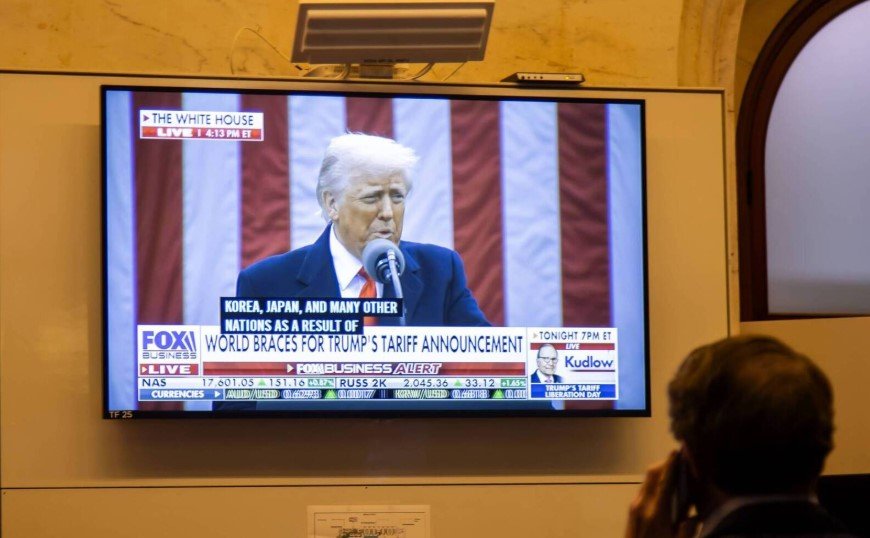Europe’s tech laws could target digital giants, but officials are divided on how far to go
BRUSSELS — With the United States unleashing new tariffs under President Trump’s administration, European officials are facing a tough decision: How should they strike back at Big Tech giants like Apple, Microsoft, Google, and Meta, who dominate the European market?
Europe’s €157 billion trade surplus in goods is overshadowed by a significant €109 billion deficit in services, especially digital services. Big Tech companies from the U.S. have long controlled key sectors across Europe, and now, some in Brussels believe these firms could be the Achilles heel in the brewing trade conflict with Washington.
Tech Laws Not Designed for Retaliation
Europe has long made clear its desire to regulate Big Tech, with laws like the Digital Markets Act (DMA) and Digital Services Act (DSA) targeting digital competition and content moderation. These regulations aim to level the playing field for European companies and curb the growing influence of the digital giants. However, neither law was ever meant to be used as a tool of trade retaliation.

The European Commission is considering tough new actions, but its options are limited. The DMA and DSA have already started to hit U.S. tech firms, with Apple and Meta bracing for hefty fines. Yet, some European governments are concerned about the economic fallout from directly confronting these powerful corporations. Dublin, for example, has warned that such measures could backfire, damaging the EU’s economy in the process.
Despite this, European Commission President Ursula von der Leyen has signaled that digital services could become one of the “cards” Europe plays in the escalating tariff dispute with Washington. But the question remains: How far should Europe go in using its tech laws as weapons?
The Growing Tension Over Tech Giants
The political pressure is mounting. U.S. tech giants, which benefit from a largely open European market, could feel the sting of increased regulation. In the past, Europe has attempted to impose higher taxes on these firms, but those efforts largely fizzled out. Now, officials are considering using their public procurement policies to decrease spending with these companies. Yet, the alternatives are limited, and Europe may be shooting itself in the foot by pushing too hard.
There’s also the looming possibility of deploying the EU’s Anti-Coercion Instrument (ACI), a powerful trade tool meant to defend against foreign pressure. The ACI, a “trade bazooka,” could allow the EU to target U.S. tech firms directly. However, the ACI has never been used in practice, and it remains untested in a real-world trade conflict.
Why Europe Won’t Directly Engage Big Tech—Yet
While European officials are aware of the potential economic and political risks of directly targeting Big Tech, some see the need for stronger enforcement of tech laws. The Commission is expected to fine Apple and Meta in the coming weeks under the DMA for anti-competitive practices. It also plans to levy penalties on Elon Musk’s X (formerly Twitter) for breaching the DSA’s content moderation rules.
Despite these moves, European lawmakers like Stéphanie Yon-Courtin argue that enforcement of the DMA should not be seen as a form of retaliation. “This regulation is conceived to establish fair rules of the game in Europe, not to be leveraged in a trade agreement with the United States,” she said.
For many European lawmakers, the core principle behind these laws is about fairness, not discrimination. They want to make it clear that the fines and penalties aren’t politically motivated, a concern that could make the legal process messy when Big Tech inevitably challenges these rulings.
Striking a Balance Between Law and Diplomacy
As Europe considers its next move in this complicated trade spat, a delicate balance must be struck. Brussels is under pressure to assert its authority while avoiding an all-out trade war with Washington. The reality is that Europe’s tech regulations and tariffs, though powerful, may not deliver the blow many anticipate.
Europe’s efforts to regulate Big Tech are driven by a desire for fairness in the digital marketplace, but as tensions grow, it’s clear that these laws could be used for much more. Could the EU make a stand without provoking an economic backlash? The coming weeks will tell if Europe’s approach to Big Tech will change, or if the two sides can find common ground before the situation escalates any further.








